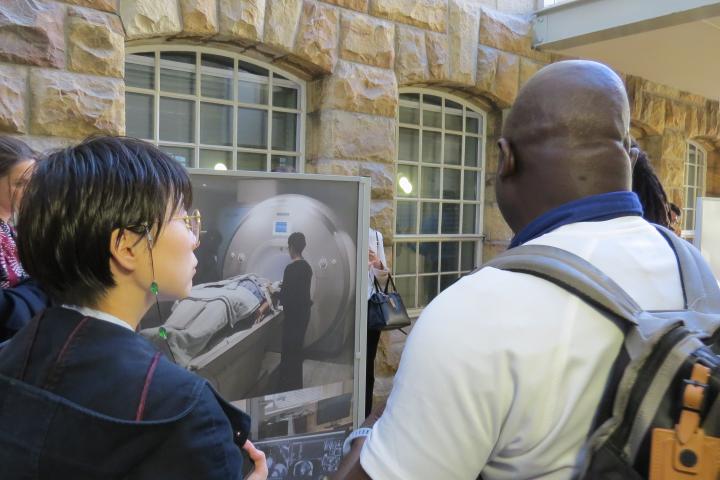Inspired to Collaborate: Reflections on the inaugural Multi-Institute Symposium

Attendees engage with powerful visual storytelling during the Discovery Picture Presentations—highlighting the creative, human side of scientific research at the inaugural Multi-Institute Symposium. Photo by: Karabo Mbele
“Inspiration” means something different to everyone. For the organisers of the first Multi-Institute Symposium (MIS), it meant sparking connections and collaborations, and creating excitement about possibility.
Held under the theme of Inflammation, the inaugural MIS was more than a showcase of biomedical research—it was a space designed to inspire researchers across the Institute of Infectious Disease and Molecular Medicine (IDM), the Neuroscience Institute (NI), the Cape Heart Institute (CHI), and the UCT Lung Institute (UCTLI) to think about intersections and to stimulate ideas around working together in new ways.
The idea for the symposium originated spontaneously during conversations among the directors of the co-hosting institutes, namely Professors Digby Warner (IDM), Karen Sliwa (CHI), Graham Fieggen (NI), and Rodney Dawson (LI). In reflecting on the people who had inspired them in their own careers, all agreed on one name: Professor Wieland Gevers. A towering figure in South African science with a long and distinguished UCT career, Prof Gevers founded the IDM and, in doing so, planted the seeds for the other institutes to grow. As Professor Valerie Mizrahi, previous Director of the IDM, put it, “We all stand on the shoulders of Professor Gevers. He paved the way for the rest of us.”
This acknowledgement shaped the symposium's purpose: to celebrate Prof. Gevers’s legacy and to use the inspiration to forge new connections between the four major institutes based on UCT’s Faculty of Health Sciences campus.
During the MIS, each of the institutes showcased two of their core facilities, exposing attendees to the available resources and highlighting the significant potential for cross-institutional use. Spanning cutting-edge microscopy, cytometry, disease models, and molecular platforms, the displays weren’t just technical exhibits—they were catalysts for connection.
Consistent with the intention to provoke and challenge, the MIS deliberately broke from tradition in adopting an experimental format: TED-style talks, informal panels, and creative sessions brought energy to the programme. Visual storytelling took centre stage in the Discovery Picture Presentations, reminding us that scientific curiosity is as creative as it is rigorous. The “Rising Stars” café, too, was very effective in allowing early-career researchers to share their work in relaxed, small-group settings. These moments captured the heart of the event: engaged, ideas-driven people inspiring each other in meaningful ways.
For many attendees, the highlight of the MIS was the announcement by IDM Director Professor Digby Warner of the Wieland Gevers Research Stimulus Award—a new funding initiative born out of the MIS that aims to support inter-institute collaboration and bold, cross-disciplinary research.
Also in attendance was the Dean of the Faculty of Health Sciences, Professor Lionel Green-Thompson, who introduced the UCT Vice-Chancellor, Professor Mosa Moshabela, for the day’s summary remarks. In a candid address, Professor Moshabela challenged everyone to think about the social and societal relevance of their work: In this time of constrained resources, he asked, how can we transform difficulty into inspiration—and ensure our work reaches those who need it?
Evening performances provided a fitting conclusion to the MIS. The CHI Choir set the tone with a soulful performance, and IDM Fellow John Woodland followed with a moving piano recital. Together, they reminded us that inspiration lives not just in research but in every pursuit that is infused with passion and joy.
This captured the essence of the MIS. Not simply a symposium, the event served as a celebration of our collective histories—and a call to carry the spirit of collaboration and discovery forward.
Inspired by a visionary. Driven by collaboration. Addressing critical health needs.
